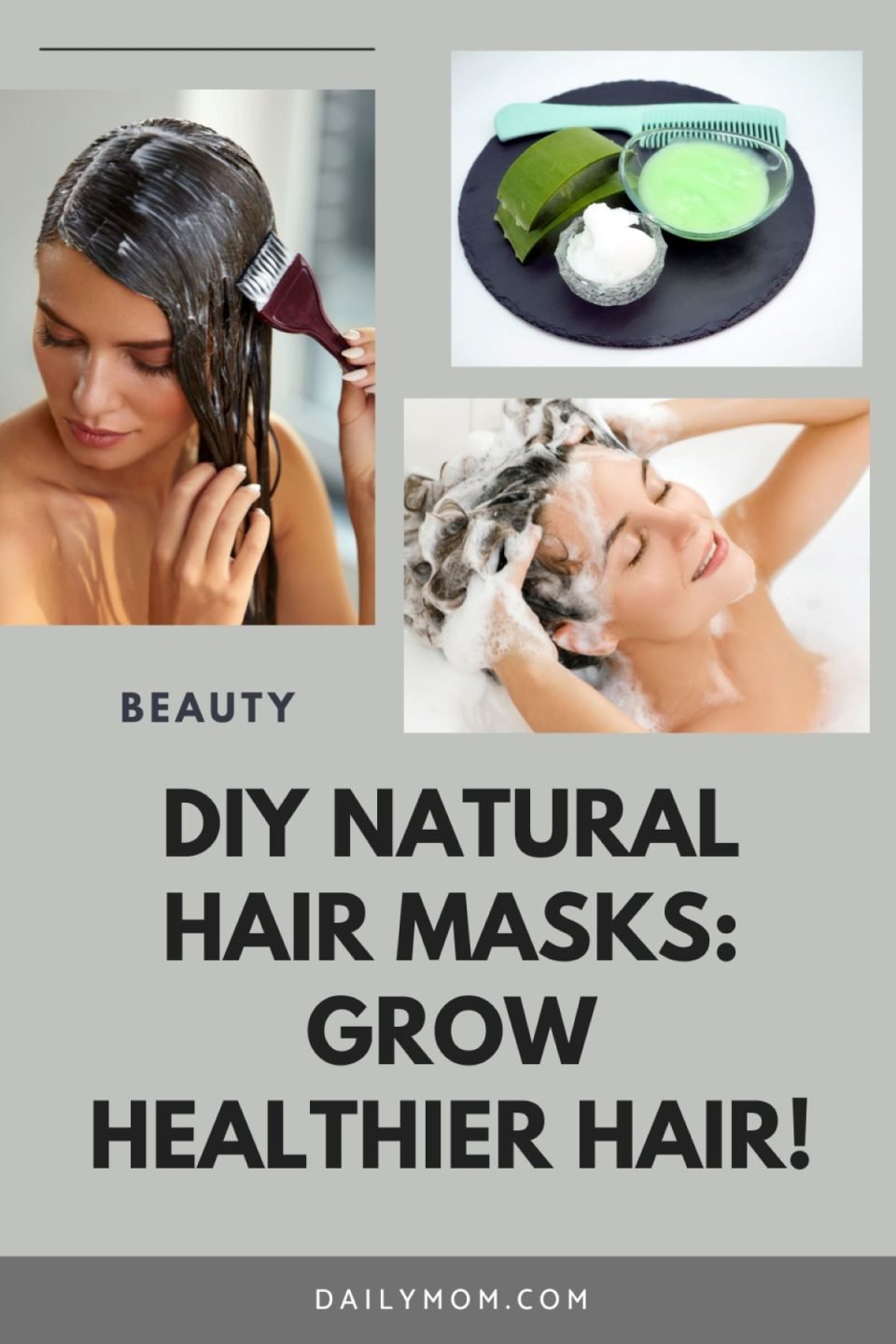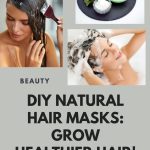When it comes to self-expression and confidence, healthy hair plays a pivotal role. We’ve all heard the saying, “Your hair is your crowning glory,” and for good reason. We all yearn for luscious, flowing locks that not only look stunning but also reflect our inner vitality. Healthy hair is often considered a symbol of beauty and confidence, and it plays a significant role in our overall appearance. However, maintaining and promoting the growth of healthy hair isn’t just about aesthetics; it’s also about taking care of an essential part of our body. Our hair, like our skin and nails, serves as a barometer of our overall well-being.
While there’s no shortage of commercial hair care products promising miraculous results, many people are turning to a more natural and holistic approach to hair care. The idea of a hair mask for growth, in particular, has gained popularity for its ability to rejuvenate and stimulate hair growth. This homemade remedy is often packed with nourishing ingredients in different forms that not only boost hair health but also provide a chemical-free alternative to the array of products available on store shelves.
Natural solutions are making a comeback, and hair care is no exception. If you’ve ever wondered how to achieve those long, lustrous locks you see in magazines, you’re in the right place. Let’s jump into the metaphorical kitchen and mix up a hair mask for growth!

Understanding Hair Growth
Before we dive into the details of a hair mask for growth, it’s crucial to understand the fundamentals of hair growth. Your hair goes through a continuous cycle, and various factors can influence its growth or even lead to setbacks. Your hair doesn’t grow overnight, and it certainly doesn’t grow at a constant rate. Understanding the hair growth cycle and the factors that influence it is key to achieving long healthy hair.
The Hair Growth Cycle
Hair goes through a natural cycle that consists of three main phases:
- Anagen Phase (Growth Phase): This is the phase where hair actively grows. It can last anywhere from two to seven years, and the length of this phase largely determines the length of your hair.
- Catagen Phase (Transitional Phase): In this intermediate phase, hair stops growing and detaches from the blood supply. It lasts for about two to three weeks.
- Telogen Phase (Resting Phase): During this phase, hair is not actively growing and can easily fall out. About 10-15% of your hair is in this phase at any given time, and it lasts for around three months.
Understanding this cycle is essential because the key to promoting hair growth is prolonging the anagen (growth) phase and minimizing hair loss during the catagen and telogen phases. It’s also important to emphasize that these phases happen in cycles–your entire head is not in one phase together all the time. So don’t panic. Your full head isn’t going to suddenly stop growing hair and then shed.
Factors That Affect Hair Growth
Numerous factors can influence your hair growth rate and overall health. Some of these factors include:
- Genetics: Your genes play a significant role in determining your hair’s growth potential. If your family has a history of slow hair growth, you may have to work a bit harder to achieve long locks.
- Nutrition: A balanced diet rich in vitamins and minerals, especially those like biotin, vitamin D, and iron, can provide the essential nutrients your hair needs to grow.
- Hormones: Hormonal changes, such as those experienced during pregnancy, menopause, or thyroid issues, can affect hair growth and texture.
- Stress: Chronic stress can lead to hair loss, so stress management is essential for maintaining healthy locks.
- Hair Care Habits: Frequent use of hot styling tools, harsh chemicals, and tight hairstyles can damage your hair and inhibit growth.
- Medical Conditions: Certain medical conditions, medications, and treatments (like chemotherapy) can impact hair growth.
While this list is not comprehensive, by understanding these key factors, you can make informed choices to support and enhance your hair’s growth potential. A hair mask for growth is one such choice, and in the next sections, we’ll explore how masks can be a valuable addition to your hair care routine.
Read More: 25 Best Hair Styling Tools For The Perfect Salon Look

Benefits of Natural Hair Masks
The beauty industry is filled with products loaded with chemicals and hefty price tags, and natural hair masks offer a refreshing and holistic alternative. DIY treatments like a hair mask for growth not only spare your hair from harsh ingredients but also provide a range of benefits that commercial products often fall short of. Here are some compelling reasons to consider incorporating natural hair masks into your hair care routine:
Chemical-Free Alternatives
One of the primary advantages of natural hair masks is their simplicity and purity. Commercial hair products often contain synthetic chemicals, sulfates, and parabens that can strip your hair of its natural oils and cause damage over time. Natural hair masks, on the other hand, rely on ingredients straight from nature, minimizing the risk of adverse reactions and long-term harm.
Nourishing Ingredients for Hair
Natural hair masks like a hair mask for growth are packed with ingredients that nourish and rejuvenate your hair. Here are a few key components commonly found in DIY hair masks and their benefits:
- Coconut Oil: Known for its deep conditioning properties, coconut oil helps moisturize and strengthen hair, reducing breakage and promoting growth.
- Honey: Honey is a natural humectant, meaning it retains moisture. It can add shine and softness to your hair while preventing frizz.
- Avocado: Rich in vitamins and healthy fats, avocado can hydrate and strengthen hair, making it more resilient to damage.
- Banana: Bananas contain vitamins and minerals that can improve the elasticity and manageability of your hair.
- Aloe Vera: Aloe vera soothes the scalp, reduces dandruff, and promotes healthy hair growth.
- Castor Oil: This thick oil is known to stimulate hair follicles and improve circulation to the scalp, aiding in hair growth.
Cost-Effective Solutions
Maintaining a hair care routine can get expensive, especially when you invest in high-end commercial products. Natural hair masks offer a budget-friendly alternative without compromising on effectiveness. Most of the ingredients needed for these masks are readily available in your kitchen or local grocery store, making them accessible to anyone seeking to enhance their hair health.
In the next section, we’ll provide you with easy-to-follow DIY natural hair mask recipes featuring some of these nourishing ingredients. These recipes will help you get started on your journey to healthier, more vibrant hair without breaking the bank. But remember, a hair mask for growth is just one factor in your hair care journey, and its effects are best when paired with other healthy hair routines.
Read More: 10 Amazing Haircare Products To Get That Fresh Salon Look

Hair Mask for Growth: DIY Natural Hair Mask Recipes
Now that you understand the benefits of natural hair masks and the other elements involved in healthy hair (nutrition and physical/emotional wellness), it’s time to roll up your sleeves and get creative in the kitchen. These DIY hair mask for growth recipes are not only easy to make but also utilize nourishing ingredients that can help boost your hair’s growth and overall health. Let’s explore three popular natural hair mask recipes:
Coconut Oil and Honey Hair Mask
Ingredients:
2 tablespoons of coconut oil
1 tablespoon of honey
Preparation and Application:
Mix the coconut oil and honey in a bowl until you have a smooth, consistent mixture.
Apply the mixture to dry or damp hair, starting from the roots to the tips.
Gently massage your scalp for a few minutes to stimulate circulation.
Cover your hair with a shower cap or warm towel and leave the mask on for 30-60 minutes.
Rinse thoroughly with lukewarm water and shampoo as usual.
Benefits:
Coconut oil deeply moisturizes and strengthens hair.
Honey adds shine and prevents frizz.
Avocado and Banana Hair Mask
Ingredients:
1 ripe avocado
1 ripe banana
Preparation and Application:
Mash the avocado and banana in a bowl until you have a creamy mixture.
Apply the mixture to damp hair, ensuring it covers every strand.
Leave the mask on for 20-30 minutes.
Rinse thoroughly with lukewarm water and shampoo as usual.
Benefits:
Avocado provides essential nutrients for hair health.
Banana improves hair’s elasticity and manageability.
Aloe Vera and Castor Oil Hair Mask
Ingredients:
2 tablespoons of aloe vera gel (fresh or store-bought)
1 tablespoon of castor oil
Preparation and Application:
Mix the aloe vera gel and castor oil in a bowl until well combined.
Apply the mixture to your scalp and hair, massaging gently.
Cover your hair with a shower cap and leave the mask on for 30-45 minutes.
Rinse thoroughly with lukewarm water and shampoo as usual.
Benefits:
Aloe vera soothes the scalp and promotes hair growth.
Castor oil stimulates hair follicles and improves circulation.
These hair mask for growth recipes are simple to make and provide your hair with the care it deserves. Choose the one that suits your hair type and needs, and you’ll be on your way to healthier, more beautiful locks.
Read More: Easy Hairstyles for Short Hair: 3 Essential Looks In Five Minutes or Less

Tips for Using Natural Hair Masks
Using natural hair masks can be a game-changer in your hair care routine, and while they aren’t challenging to mix up, achieving the best results requires some know-how. Here are some valuable tips to make the most of your hair mask for growth DIY experience:
How Often to Use Them
The frequency of applying a hair mask for growth largely depends on your hair type and its specific needs. Here’s a general guideline:
- Dry or Damaged Hair: If your hair is dry, damaged, or lacks luster, consider using a hair mask once a week. This frequency helps replenish moisture and repair damage.
- Normal Hair: For those with normal hair, using a hair mask every 2-4 weeks can help maintain its health and shine.
- Oily Hair: If you have oily hair, be cautious with masks that are too heavy. Opt for lighter masks and use them every 3-4 weeks.
- Scalp Issues: If you’re targeting specific scalp issues like dandruff or hair loss, you may benefit from more frequent application (2-3 times a week) until the issue improves.
Hair Type Considerations
Not all hair masks are created equal, and different hair types have different needs. Consider these factors:
- Fine Hair: For fine hair, choose lightweight masks that won’t weigh your hair down. Avoid heavy, oil-based masks.
- Curly or Coarse Hair: Curly and coarse hair types benefit from masks rich in moisture and oils. They can handle heavier treatments.
- Colored Hair: If you have colored hair, look for masks that are color-safe and won’t strip your hair of its dye.
Precautions to Take
While natural hair masks are generally safe, it’s essential to take precautions to ensure the best results:
- Patch Test: Before applying a new hair mask, do a patch test on a small section of your hair to check for allergies or adverse reactions.
- Don’t Overdo It: Using hair masks too frequently or leaving them on for extended periods can lead to product buildup or over-conditioning, which can make your hair look greasy or flat.
- Rinse Thoroughly: Always rinse out the mask thoroughly to prevent any residue that may make your hair look dull or oily.
- Protect Your Bedding: If you leave a hair mask on overnight, consider protecting your pillowcase with a towel or a plastic shower cap to prevent staining.
Choosing the Right Hair Mask for Growth
Choosing the right hair mask for growth that aligns with your unique needs and preferences is as important as knowing your hair type and how often to use a mask. Here’s how to make an informed choice:
- Identify Your Hair Goals: Start by identifying your specific hair goals. Are you looking to boost overall hair health, reduce breakage, or address issues like dandruff or hair loss? Different hair masks cater to various needs, so knowing your goal is the first step.
- Consider Your Hair Type: Your hair type plays a significant role in determining which hair mask will work best for you. Is your hair fine and prone to oiliness, or is it thick and curly? Understanding your hair type will help you select a mask that complements your natural texture.
- Read Labels Carefully: When shopping for or creating a hair mask, read the labels or ingredient lists carefully. Look for masks that contain ingredients known to promote hair growth, such as aloe vera, castor oil, or essential oils like rosemary or peppermint.
- DIY vs. Store-Bought: You have the option to choose between DIY hair masks made from fresh ingredients or store-bought ones. Both can be effective, but it ultimately depends on your preference and convenience. DIY masks allow you to control the ingredients, while store-bought options offer convenience.
- Consistency Is Key: Achieving the best results with a hair mask for growth requires consistency. Incorporate the mask into your hair care routine and use it as recommended for your hair type and goals. Over time, you’ll notice improvements in the health and growth of your hair.
Incorporating these considerations into your decision-making process will help you select the ideal hair mask for growth that aligns with your goals and hair type. With these tips in mind, you’ll be well-equipped to use a hair mask for growth effectively, tailored to your hair type and needs.
Read More: 25 Natural Haircare Products For Longer, Healthy Hair

Other Practices for Healthy Hair Growth
While a hair mask for growth can work wonders for your hair, it’s just one piece of the puzzle when it comes to maintaining and promoting healthy hair growth. Incorporating other practices into your routine can amplify the results and ensure that you have the luscious locks you desire. Here are some additional practices to consider:
A Balanced Diet
We mentioned this before, and it’s so important we’re saying it again: What you eat plays a crucial role in the health of your hair. Make sure your diet includes foods rich in essential nutrients for hair growth, such as:
- Protein: Hair is primarily made of protein, so include sources like lean meats, fish, eggs, and legumes in your diet.
- Vitamins: Vitamins like biotin (B7), vitamin D, and vitamin E are known to promote healthy hair. You can find these in foods like nuts, seeds, and leafy greens.
- Iron: Iron deficiency can lead to hair loss, so consume iron-rich foods like spinach, lentils, and lean meats.
Proper Hair Care Routine
A good hair care routine is essential for maintaining the health of your hair. Aside from a hair mask for growth, here are some other common tips:
- Gentle Washing: Avoid overwashing your hair, as it can strip it of natural oils. Use a sulfate-free shampoo and conditioner suitable for your hair type.
- Avoid Heat Damage: Minimize the use of heat styling tools, and when you do use them, use a heat protectant spray.
- Regular Trims: Trim your hair every 6-8 weeks to remove split ends and encourage healthy growth.
- Use a Wide-Toothed Comb or Scalp Brush: This reduces breakage and minimizes damage while detangling, as well as stimulates the scalp for growth.
Stress Management
Again, this one is important, so it bears repeating: Stress can take a toll on your hair’s health. High stress levels can lead to hair loss, so it’s crucial to find ways to manage stress effectively. Consider practices like meditation, yoga, or mindfulness to help reduce stress and promote overall well-being.
Incorporating these practices into your daily life, in addition to using a hair mask for growth, can help you achieve the long, healthy, and vibrant hair you’ve always wanted.
Read More: Beauty Hacks & The Best Haircare Products For Families
Achieving and maintaining healthy hair growth is within your reach. A hair mask for growth, with its chemical-free ingredients and nourishing properties, is a fantastic addition to your hair care routine. Coupled with a balanced diet, proper hair care, and stress management, you now hold the secret to luscious locks that turn heads wherever you go.
So, go ahead, pamper your hair with natural hair masks, embrace a holistic approach to hair care, and watch your tresses transform into a beautiful, vibrant mane. Here’s to healthier, happier hair!
WANT TO READ MORE?
Check out Daily Mom’s Beauty section for more tips and tricks!
CONNECT WITH DAILY MOM
💖 NEWSLETTER: DAILY READS IN YOUR INBOX 💖
Sign up to receive our picks for the best things to do, see and buy so you can relax and focus on more important tasks! Let us help you be the best version of yourself you can be!
BE SOCIAL WITH US
📌 LOVE IT? PIN IT!📌












































